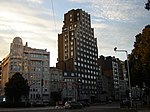Etterbeek railway station

Etterbeek railway station (Dutch: Station Etterbeek, French: Gare d'Etterbeek) is a railway station in Brussels, Belgium operated by SNCB. The station is named after the municipality of Etterbeek though it is located in the neighbouring municipality of Ixelles, at the Couronne/Kroon crossroad on the greater ring. It first opened in 1880, and was as of 2007 the 29th most used railway station in Belgium, with 5,565 passengers per day. In 2014 the station was used by 4,766 passengers on weekdays. The Etterbeek railway station is located on the line 161 Brussels - Namur, between the stations Germoir/Mouterij and Watermaal. Some trains from line 26 also call at this station between Delta and Boondael.
Excerpt from the Wikipedia article Etterbeek railway station (License: CC BY-SA 3.0, Authors, Images).Etterbeek railway station
Boulevard Général Jacques - Generaal Jacqueslaan,
Geographical coordinates (GPS) Address External links Nearby Places Show on map
Geographical coordinates (GPS)
| Latitude | Longitude |
|---|---|
| N 50.822222222222 ° | E 4.3894444444444 ° |
Address
Boulevard Général Jacques - Generaal Jacqueslaan 263F
1050
Belgium
Open on Google Maps






